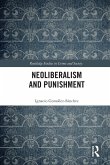55,95 €
55,95 €
inkl. MwSt.
Sofort per Download lieferbar

28 °P sammeln
55,95 €
Als Download kaufen

55,95 €
inkl. MwSt.
Sofort per Download lieferbar

28 °P sammeln
Jetzt verschenken
Alle Infos zum eBook verschenken
55,95 €
inkl. MwSt.
Sofort per Download lieferbar
Alle Infos zum eBook verschenken

28 °P sammeln
- Format: ePub
- Merkliste
- Auf die Merkliste
- Bewerten Bewerten
- Teilen
- Produkt teilen
- Produkterinnerung
- Produkterinnerung

Bitte loggen Sie sich zunächst in Ihr Kundenkonto ein oder registrieren Sie sich bei
bücher.de, um das eBook-Abo tolino select nutzen zu können.
Hier können Sie sich einloggen
Hier können Sie sich einloggen
Sie sind bereits eingeloggt. Klicken Sie auf 2. tolino select Abo, um fortzufahren.

Bitte loggen Sie sich zunächst in Ihr Kundenkonto ein oder registrieren Sie sich bei bücher.de, um das eBook-Abo tolino select nutzen zu können.
What is punishment? Why do we punish? How much do we punish? What works in punishment? This book explores some of these questions and more, revealing that some of the answers are interconnected and that conventional wisdom is not always right.
- Geräte: eReader
- mit Kopierschutz
- eBook Hilfe
- Größe: 2.08MB
Andere Kunden interessierten sich auch für
![Rethinking Punishment in the Era of Mass Incarceration (eBook, ePUB) Rethinking Punishment in the Era of Mass Incarceration (eBook, ePUB)]() Rethinking Punishment in the Era of Mass Incarceration (eBook, ePUB)41,95 €
Rethinking Punishment in the Era of Mass Incarceration (eBook, ePUB)41,95 €![Community Punishment (eBook, ePUB) Community Punishment (eBook, ePUB)]() Community Punishment (eBook, ePUB)52,95 €
Community Punishment (eBook, ePUB)52,95 €![Handbook on Prisons and Jails (eBook, ePUB) Handbook on Prisons and Jails (eBook, ePUB)]() Handbook on Prisons and Jails (eBook, ePUB)45,95 €
Handbook on Prisons and Jails (eBook, ePUB)45,95 €![Power, Conflict and Criminalisation (eBook, ePUB) Power, Conflict and Criminalisation (eBook, ePUB)]() Phil ScratonPower, Conflict and Criminalisation (eBook, ePUB)49,95 €
Phil ScratonPower, Conflict and Criminalisation (eBook, ePUB)49,95 €![Mass Incarceration in the 21st Century (eBook, ePUB) Mass Incarceration in the 21st Century (eBook, ePUB)]() Mass Incarceration in the 21st Century (eBook, ePUB)41,95 €
Mass Incarceration in the 21st Century (eBook, ePUB)41,95 €![Privatising Punishment in Europe? (eBook, ePUB) Privatising Punishment in Europe? (eBook, ePUB)]() Privatising Punishment in Europe? (eBook, ePUB)47,95 €
Privatising Punishment in Europe? (eBook, ePUB)47,95 €![Neoliberalism and Punishment (eBook, ePUB) Neoliberalism and Punishment (eBook, ePUB)]() Ignacio González-SánchezNeoliberalism and Punishment (eBook, ePUB)41,95 €
Ignacio González-SánchezNeoliberalism and Punishment (eBook, ePUB)41,95 €-
-
-
What is punishment? Why do we punish? How much do we punish? What works in punishment? This book explores some of these questions and more, revealing that some of the answers are interconnected and that conventional wisdom is not always right.
Dieser Download kann aus rechtlichen Gründen nur mit Rechnungsadresse in A, B, BG, CY, CZ, D, DK, EW, E, FIN, F, GR, HR, H, IRL, I, LT, L, LR, M, NL, PL, P, R, S, SLO, SK ausgeliefert werden.
Produktdetails
- Produktdetails
- Verlag: Taylor & Francis
- Seitenzahl: 178
- Erscheinungstermin: 10. Februar 2017
- Englisch
- ISBN-13: 9781317486978
- Artikelnr.: 47906669
- Verlag: Taylor & Francis
- Seitenzahl: 178
- Erscheinungstermin: 10. Februar 2017
- Englisch
- ISBN-13: 9781317486978
- Artikelnr.: 47906669
- Herstellerkennzeichnung Die Herstellerinformationen sind derzeit nicht verfügbar.
Karol M. Lucken is Associate Professor in the Department of Criminal Justice, University of Central Florida, USA
Preface
1. Introduction
1.1 From "Get-Tough" to "Get-Smart"
1.2 Chapter Framework
1.3 A Note on Exclusions and Terminology
2. Justifying Punishment: A Moral and Economic Defense of Policy
2.1 Part I: Classic Philosophies of Punishment
2.2 Part II: Post-Classic Justifications of Punishment
2.3 Summary and Conclusions
3. Defining Punishment: The Essential Attributes of Penal Activity
3.1 What is Punishment? Definitions from the Academic Literature
3.2 What is Punishment? A Legal Framework
3.3 What is Punishment? A Social Control Framework
3.4 What is Punishment? A Power Theory Framework
3.5 Summary and Conclusions
4. Measuring Punishment: The Scope & Severity of Penal Activity
4.1 A Brief History on the Measurement of Punishment
4.2 Part I: The Scope of Penal Activity
4.3 Part II: The Severity of Penal Activity
4.4 Summary and Conclusions
5. Evaluating Punishment: "What Works" and the Pursuit of Effectiveness
5.1 The Expectations and Evaluation of Punishment: An Historical
Perspective
5.2 The New Evidence-Based Culture
5.3 What We Know About "What Works"
5.4 Summary and Conclusions
6. Prescribing Punishment: Alternative Directions in Research & Policy
6.1 Conventions in Prescribing Research & Policy
6.2 Justifying Punishment: Loss Reduction as Penal Policy
6.3 Defining & Measuring Punishment: More Debate, More Data
6.4 Evaluating Punishment: Severity, Community and Insider Knowledge
6.5 Final Thoughts
1. Introduction
1.1 From "Get-Tough" to "Get-Smart"
1.2 Chapter Framework
1.3 A Note on Exclusions and Terminology
2. Justifying Punishment: A Moral and Economic Defense of Policy
2.1 Part I: Classic Philosophies of Punishment
2.2 Part II: Post-Classic Justifications of Punishment
2.3 Summary and Conclusions
3. Defining Punishment: The Essential Attributes of Penal Activity
3.1 What is Punishment? Definitions from the Academic Literature
3.2 What is Punishment? A Legal Framework
3.3 What is Punishment? A Social Control Framework
3.4 What is Punishment? A Power Theory Framework
3.5 Summary and Conclusions
4. Measuring Punishment: The Scope & Severity of Penal Activity
4.1 A Brief History on the Measurement of Punishment
4.2 Part I: The Scope of Penal Activity
4.3 Part II: The Severity of Penal Activity
4.4 Summary and Conclusions
5. Evaluating Punishment: "What Works" and the Pursuit of Effectiveness
5.1 The Expectations and Evaluation of Punishment: An Historical
Perspective
5.2 The New Evidence-Based Culture
5.3 What We Know About "What Works"
5.4 Summary and Conclusions
6. Prescribing Punishment: Alternative Directions in Research & Policy
6.1 Conventions in Prescribing Research & Policy
6.2 Justifying Punishment: Loss Reduction as Penal Policy
6.3 Defining & Measuring Punishment: More Debate, More Data
6.4 Evaluating Punishment: Severity, Community and Insider Knowledge
6.5 Final Thoughts
Preface
1. Introduction
1.1 From "Get-Tough" to "Get-Smart"
1.2 Chapter Framework
1.3 A Note on Exclusions and Terminology
2. Justifying Punishment: A Moral and Economic Defense of Policy
2.1 Part I: Classic Philosophies of Punishment
2.2 Part II: Post-Classic Justifications of Punishment
2.3 Summary and Conclusions
3. Defining Punishment: The Essential Attributes of Penal Activity
3.1 What is Punishment? Definitions from the Academic Literature
3.2 What is Punishment? A Legal Framework
3.3 What is Punishment? A Social Control Framework
3.4 What is Punishment? A Power Theory Framework
3.5 Summary and Conclusions
4. Measuring Punishment: The Scope & Severity of Penal Activity
4.1 A Brief History on the Measurement of Punishment
4.2 Part I: The Scope of Penal Activity
4.3 Part II: The Severity of Penal Activity
4.4 Summary and Conclusions
5. Evaluating Punishment: "What Works" and the Pursuit of Effectiveness
5.1 The Expectations and Evaluation of Punishment: An Historical
Perspective
5.2 The New Evidence-Based Culture
5.3 What We Know About "What Works"
5.4 Summary and Conclusions
6. Prescribing Punishment: Alternative Directions in Research & Policy
6.1 Conventions in Prescribing Research & Policy
6.2 Justifying Punishment: Loss Reduction as Penal Policy
6.3 Defining & Measuring Punishment: More Debate, More Data
6.4 Evaluating Punishment: Severity, Community and Insider Knowledge
6.5 Final Thoughts
1. Introduction
1.1 From "Get-Tough" to "Get-Smart"
1.2 Chapter Framework
1.3 A Note on Exclusions and Terminology
2. Justifying Punishment: A Moral and Economic Defense of Policy
2.1 Part I: Classic Philosophies of Punishment
2.2 Part II: Post-Classic Justifications of Punishment
2.3 Summary and Conclusions
3. Defining Punishment: The Essential Attributes of Penal Activity
3.1 What is Punishment? Definitions from the Academic Literature
3.2 What is Punishment? A Legal Framework
3.3 What is Punishment? A Social Control Framework
3.4 What is Punishment? A Power Theory Framework
3.5 Summary and Conclusions
4. Measuring Punishment: The Scope & Severity of Penal Activity
4.1 A Brief History on the Measurement of Punishment
4.2 Part I: The Scope of Penal Activity
4.3 Part II: The Severity of Penal Activity
4.4 Summary and Conclusions
5. Evaluating Punishment: "What Works" and the Pursuit of Effectiveness
5.1 The Expectations and Evaluation of Punishment: An Historical
Perspective
5.2 The New Evidence-Based Culture
5.3 What We Know About "What Works"
5.4 Summary and Conclusions
6. Prescribing Punishment: Alternative Directions in Research & Policy
6.1 Conventions in Prescribing Research & Policy
6.2 Justifying Punishment: Loss Reduction as Penal Policy
6.3 Defining & Measuring Punishment: More Debate, More Data
6.4 Evaluating Punishment: Severity, Community and Insider Knowledge
6.5 Final Thoughts







